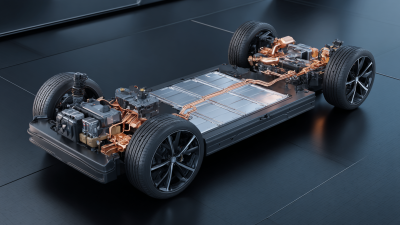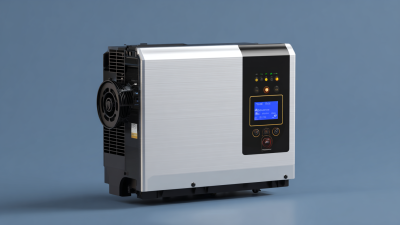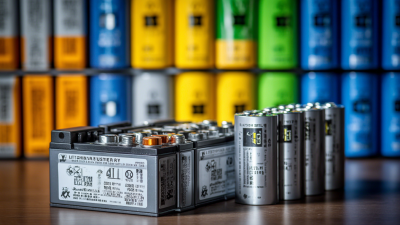
As the world continues to grapple with the urgent need for sustainable energy solutions, lithium home batteries are emerging as a game-changer in the realm of eco-friendly living. These innovative energy storage systems not only provide homeowners with a reliable source of power but also pave the way for a more sustainable lifestyle. By harnessing solar energy and reducing reliance on fossil fuels, lithium home batteries can significantly diminish our carbon footprint. In this blog, we will explore ten creative and practical applications of lithium home batteries that can help households embrace sustainability. From powering electric vehicles to enhancing energy independence, these innovative uses demonstrate how integrating technology into our daily lives can lead to a greener future. Join us as we delve into the transformative potential of lithium home batteries and their role in fostering a more sustainable tomorrow.

With the rising focus on sustainable living, innovative energy storage solutions are becoming increasingly essential for homeowners.
Lithium home batteries play a significant role in enhancing sustainability by allowing households to store renewable energy generated from sources like solar panels. By harnessing this energy, homeowners can reduce their reliance on the grid, ultimately minimizing their carbon footprint and energy costs.
Tip 1: Consider installing a lithium home battery system to maximize the use of your renewable energy sources. This will allow you to store excess energy produced during the day for use during nighttime or cloudy days, ensuring energy availability when you need it most.
Innovations in battery technology, such as advancements in lithium-ion batteries, are also contributing to improved safety, longer life, and higher energy densities compared to traditional options. Many companies are working on developing next-generation energy storage systems that promise enhanced performance for residential applications.
Tip 2: Keep an eye on emerging battery technologies and explore options that offer a better balance of efficiency, cost, and reliability. Doing your research will ensure you choose a battery system that not only fits your energy needs but is also aligned with your sustainability goals.
Harnessing solar power through lithium home batteries is a pivotal step towards maximizing energy efficiency in sustainable living. Recent advancements in energy storage technologies have shown that integrating solar panel systems with home batteries significantly enhances energy management and reduces reliance on the grid. According to industry reports, the global energy storage market is expected to grow to $546 billion by 2035, underscoring the increasing adoption of storage solutions as we strive for net-zero emissions.

Utilizing lithium home batteries not only enables homeowners to store excess energy generated from solar panels but also facilitates efficient energy usage during peak hours. Research indicates that by optimizing energy consumption patterns through smart home energy management strategies, households can cut energy costs by up to 30%. With the growing efficiency of photovoltaic systems and the decreasing cost of lithium battery storage, homeowners are now better positioned than ever to invest in sustainable technologies that benefit both the environment and their wallets. This shift towards integrated energy solutions is set to revolutionize how we consume and manage energy in our daily lives.
The rise of electric vehicles (EVs) has greatly transformed the landscape of sustainable transport, with lithium batteries playing a crucial role in this revolution. These batteries not only power the vehicles themselves but also offer a seamless integration with home energy systems. By employing lithium home batteries, EV owners can store excess energy generated from renewable sources, such as solar panels, and use it to recharge their vehicles, creating a sustainable cycle of energy use. This not only reduces dependency on traditional fossil fuels but also lowers overall electricity costs.
Moreover, the synergy between electric vehicles and lithium battery technology enhances the efficiency of energy management. With smart home systems, users can monitor and control their energy usage, optimizing the charging of their EVs during off-peak hours or when renewable energy production is at its highest. This intelligent integration ensures that the transportation sector moves towards greener alternatives while promoting a more sustainable lifestyle. As lithium battery technology continues to advance, we can expect even greater innovations that will further facilitate this seamless connection, paving the way for a cleaner, more sustainable future.
| Use Case | Description | Impact on Sustainability |
|---|---|---|
| Energy Storage for Renewable Sources | Store excess energy from solar panels or wind turbines. | Reduces reliance on fossil fuels and enhances grid stability. |
| Backup Power Supply | Provide power during outages or emergencies. | Ensures continuity of essential services and reduces panic. |
| Smart Home Integration | Integrate with smart home systems for optimized energy use. | Promotes efficient energy use and lowers overall consumption. |
| Electric Vehicle Charging | Charge electric vehicles directly from home battery systems. | Encourages cleaner transportation and reduces emissions. |
| Grid Services and Demand Response | Participate in energy market and supply services to the grid. | Helps balance energy supply and demand, improving grid resiliency. |
| Seasonal Energy Storage | Store energy for use in different seasons, especially winter. | Maximizes renewable use year-round and reduces peak load issues. |
| Community Energy Sharing | Share energy with neighbors to support local communities. | Strengthens community ties and promotes local energy resilience. |
| Off-grid Living | Enable self-sufficiency in remote areas without grid access. | Supports sustainable lifestyles and reduces carbon footprints. |
| Home Automation for Energy Efficiency | Automated energy management based on usage patterns. | Optimizes energy use, resulting in lower utility bills and emissions. |
In the realm of off-grid living, lithium battery systems are revolutionizing how remote homes harness and utilize energy. These advanced batteries offer a compact and efficient way to store solar energy, making them an ideal choice for those who seek independence from traditional power grids. By integrating lithium batteries with solar panels, residents of remote areas can maintain a continuous energy supply, empowering them to live sustainably without the constraints of conventional electricity sources.

Moreover, lithium home batteries enhance the resilience of off-grid living by allowing homeowners to manage their energy consumption effectively. With smart energy management systems, users can monitor battery levels, optimize energy usage, and even store excess power for use during periods of low sunlight. This capability not only minimizes the carbon footprint of remote homes but also promotes a self-sufficient lifestyle where individuals can rely on renewable energy tailored to their needs. As the technology continues to evolve, the potential for lithium batteries to facilitate greener, off-grid living becomes increasingly promising.
Demand response and smart grids are revolutionizing how we manage energy consumption, and lithium batteries play a crucial role in this transformation. With the rise of renewable energy sources, such as solar and wind, the ability to store energy efficiently is paramount. According to a report by the International Energy Agency, the demand for lithium-ion batteries is expected to reach 2,000 GWh by 2030, driven largely by advancements in grid storage solutions. Lithium batteries enable homes to store excess energy generated during peak sunlight or windy days, which can be dispatched back into the grid or used during peak demand, enhancing overall system reliability.
Tips for homeowners looking to integrate lithium batteries into their energy management strategies include monitoring usage patterns and understanding peak demand times. By aligning energy consumption with off-peak periods, households can minimize costs while contributing to grid stability. Additionally, installing a home energy management system (HEMS) can optimize energy use and provide real-time data, ensuring that batteries are charged efficiently when rates are lower.
Furthermore, the integration of smart appliances can enhance the effectiveness of lithium batteries. Devices that can adjust their running times based on grid conditions not only lead to significant cost savings but also support sustainability goals. As the energy landscape continues to evolve, leveraging the capabilities of lithium batteries within smart grids is critical for efficient, future-proof energy management.





